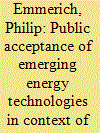| Srl | Item |
| 1 |
ID:
176656


|
|
|
|
|
| Summary/Abstract |
Trials of technologies designed to promote residential demand-side energy management (DSM) have found aggregate levels of load-shifting behaviour and curtailment in energy use. These aggregate data, however, mask considerable differences in people's engagement in DSM at an individual household level. We present the findings of a quantitative exploration of people's intentions to use a home energy management system (HEMS) for residential DSM in the United Kingdom. The technology acceptance model (TAM) was used in conjunction with constructs measuring psychological empowerment and environmental attitudes to explore participants' acceptance of a HEMS to facilitate load-shifting. Findings from a mediation analysis showed perceptions of the usefulness of the HEMS and its ease of use were important predictors of people's intentions to use one. They also highlight a potential conflict between an individual's home energy consumption goals and national DSM goals. The implications of these findings for understanding end-user acceptance of HEMS are discussed. We conclude that seeking opportunities to promote shared, internalised goals for residential DSM may be an avenue for increasing the uptake and use of technologies designed to enable load-shifting (and other energy conservation behaviours) among end-users.
|
|
|
|
|
|
|
|
|
|
|
|
|
|
|
|
| 2 |
ID:
176806


|
|
|
|
|
| Summary/Abstract |
Technology acceptance represents a challenge for the successful implementation of emerging energy technologies. Building on previous literature, we developed and assessed a socio-psychological factor model, which we apply to three different energy technologies that are relevant to the German energy transition. Our model analyses factors such as trust in industry, trust in municipalities, perceived problems of the current energy system and environmental self-identity with regard to acceptance both in general (general acceptance) and in the context of a scenario featuring a nearby implementation (local acceptance). These factors are mediated by affect and perceived effects, including perceived benefits, costs and risks. We tested the applicability of our model across three different energy technologies: hydrogen fuel stations, biofuel production plants and stationary battery storage facilities. Our study confirms previous findings, which stress the relevance of psychological and social factors. It also extends the literature, testing a universal model across different technologies and examining acceptance on both the local and the general level. We explored the implications of our findings for the selected technologies and managerial practice.
|
|
|
|
|
|
|
|
|
|
|
|
|
|
|
|